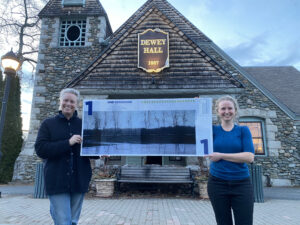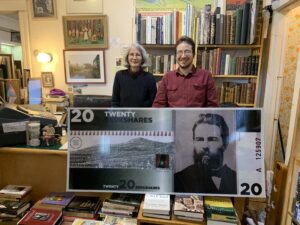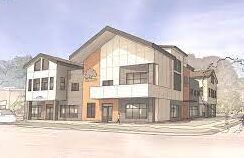In BerkShares, Berkshires’ roots of ‘buy local’ predated pandemic
by Danny Jin
GREAT BARRINGTON — While a slew of voices joined calls to “buy local” after the coronavirus pandemic hit, those ideas already had deep roots in Berkshire County.
As local residents and businesses struggled during pandemic-related shutdowns, and federal aid did not cover lost income, online retailers and multinational corporations raked in record profits. The stark picture for local economies led to widespread calls to support Main Street establishments, including through advertising campaigns such as the $2 million “My Local MA” push established by Gov. Charlie Baker’s administration.
When it comes to buying local, a Berkshire County currency exists for people to do just that. At local banks, you can exchange $95 for 100 BerkShares, which will get you $100 worth of goods at the more than 400 local businesses accepting the currency.
Incentivizing consumption that keeps money in the community and supports local jobs never has been more timely, say leaders of the Schumacher Center for a New Economics, which pioneered BerkShares in 2006.
BerkShares and other Schumacher Center initiatives, they say, stem from a conviction that it should be the community, not market forces, that determines how to organize an economy that works for people.
“It’s been more visible and deeper in the psyche that, as citizens of the region, it’s up to us to build those local supply chains, build those local connections,” said Susan Witt, executive director of the Schumacher Center.
“Even though BerkShares could be taken by any local branch of a chain store, they don’t take it because the revenue that comes into that chain store will fly out of the Berkshires into some global corporate center,” Witt said. “What BerkShares does is, it distinguishes the locally owned businesses … and in supporting those local businesses, you’re also supporting the multiple aspects that make up a community.”
The life cycle of a BerkShare often doesn’t just end at a store. After all, business owners take a 5 percent loss if they cash in BerkShares at the bank.
Steffen Root, co-owner of Berkshire Bike & Board, said he is “proud that I’ve never brought a BerkShare I’ve taken in back to the bank.”
“For every dollar someone gives me in BerkShares, I can go and spend that dollar at Gorham and Norton’s, and they can go spend it at the Kwik Print,” Root said. “That one dollar can literally keep us going if we can keep it in the community and it never leaves the community. … Compare it to every time someone uses a credit card, when 2 or 3 percent [of the transaction] is instantly gone outside our community.”
Although many people have stopped using cash during the pandemic, the volume of BerkShares in circulation has remained relatively constant, at about 140,000, said Rachel Moriarty, the Schumacher Center’s director of operations. That’s an encouraging sign, she said, and the center also is exploring the possibility of taking BerkShares digital to make spending more convenient. While it still is unclear whether digital BerkShares will be feasible, physical BerkShares are certain to remain.
The Schumacher Center takes much of its orientation from its namesake, the late German-British economist E.F. Schumacher. Best known for his 1973 work “Small is Beautiful: A Study of Economics as if People Mattered,” Schumacher sought to center economies around local communities.
Rather than cookie-cutter government programs seeking to boost economic growth, that outlook favors citizen-directed initiatives aimed at “appropriate growth” aligned with local needs, Witt said.
In Great Barrington, the center found a fitting home for its work, Witt said.
“Historically, more tax dollars go out of the region than come back in, so, the Berkshires have learned to solve problems on their own and be creative,” Witt said. “It’s not just a Schumacher way of thinking. It’s kind of a Berkshires way of thinking.”
Beyond supporting existing businesses, the Schumacher Center seeks to find ways to promote the creation of new businesses that use local skills and production capacities to achieve what’s known as “import replacement.” When goods that could be produced locally are imported, that means there is a gap through which jobs and money leave the community, Witt said.
“If, for example, we had a buyer, say, that five years form today, we’ll buy all of our apple sauce locally, that would mean farmers could plant out their north slopes with apple trees with a guaranteed market,” Witt said. “It means cooperative efforts could go to building a cannery to process. It would take that combined effort of institutions, citizens and local governments to create the basis of a new economy.”
The community land trust model, Witt said, could play a key role in that pursuit.
With guidance from the Schumacher Center, the nonprofit Berkshire Community Land Trust leases land on its three properties to homeowners and businesses, alleviating the barrier of land cost. Rather than allow land to be purchased and developed by the highest bidder on the market, the strategy is to put it to a use that benefits community members.
“The community has got to think about what the community wants,” said Rob Putnam, interim principal at Richmond Consolidated School and a member of the Berkshire Community Land Trust’s board of trustees. “There’s got to be a long-term idea about how we make Berkshire County sustainable and affordable.”
During the pandemic, housing prices in southern Berkshire County “really skyrocketed in a way that makes it really inaccessible, unless you’re really wealthy,” said Sam VanSant, who owns carpentry and construction company Cobalt LLC and serves on the Berkshire Community Land Trust’s board of trustees.
“The goal, to me, would be that if you work in the community, you can live in the community,” VanSant said. “It seems crazy to me that I’m meeting people who have to travel sometimes an hour and a half to get to work.”
The pandemic also has generated newfound attention from outside the county to the Schumacher Center’s work. Interested in starting universal basic income programs with a BerkShares-esque component to keep money local, several cities have reached out for consultation, Moriarty said.
“People are realizing that they can’t necessarily sit back and wait for someone else to take charge, and they are organizing within community to implement some of these different economic tools,” she said.
This story was originally published in the Berkshire Eagle on April 25, 2021, linked here.





